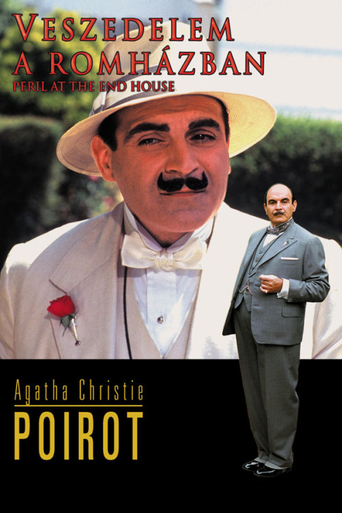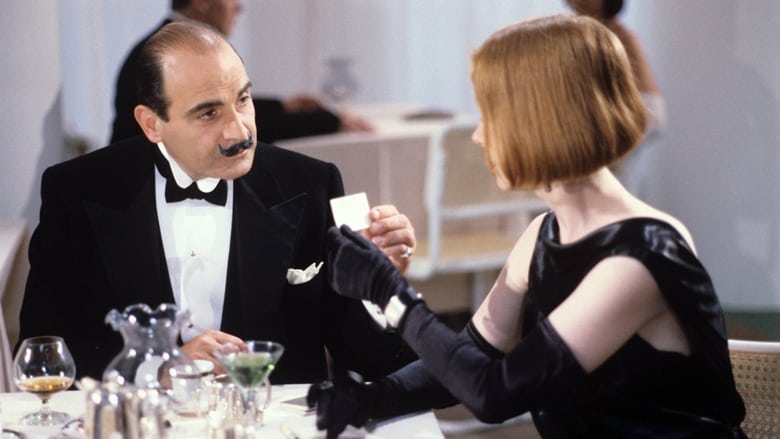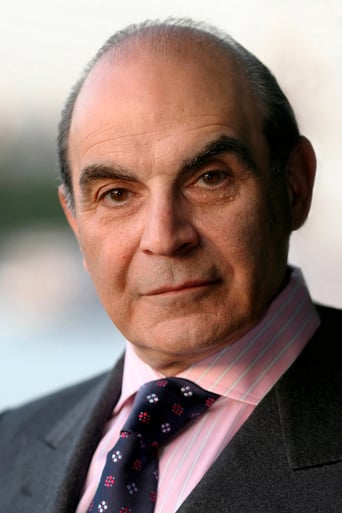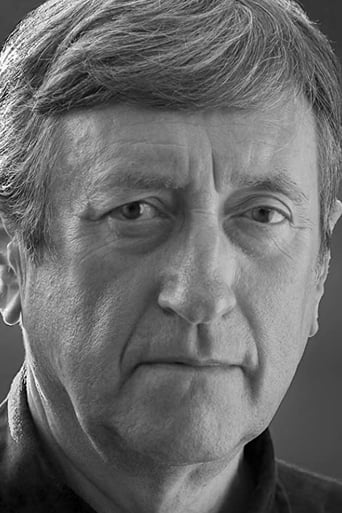

Peril at End House (1990)
Watch Trailer
Cast
Reviews
Slow pace in the most part of the movie.
People are voting emotionally.
A different way of telling a story
I cannot think of one single thing that I would change about this film. The acting is incomparable, the directing deft, and the writing poignantly brilliant.
The first of Christie's full length novels to be adapted for ITVs long running Poirot, Peril at End House sets the mark (a high one). Without giving away too much, I'll say that, for me anyway, there was a definitive line between the aspects of the film that I class as "good" and "bad". To begin with the good - as usual the acting is of top quality; Polly Walker stood out particularly as young Nick Buckley, Alison Sterling portrayed Fredrica Rice perfectly, pale faced, a little aloof exactly as I'd envisaged her in the book; and of course David Suchet as the brilliant Hercule Poirot. Seeing Carol Macready (102 Dalmatians) was a pleasant surprise, not whom I'd have pictured as Mrs Croft - she seemed considerably younger and vivacious compared to the disabled Mrs Croft in the book, however brought a grin to my face on several occasions. Yet again, the music is beautiful, as are costumes (notably Polly Walker in her first scene). The time period has been captured and presented exceptionally well bringing a real authentic feel to the film, something that isn't as strong with some of the newer Poirot adaptations.Peril at End House is almost entirely faithful to the novel which is in the middle of the road of the five Poirot stories I've read, the best being Death on The Nile. I love the story and the intricacy of some of the characters as they grow throughout. Despite identifying the murderer early on (I rarely do) there's always another twist or turn waiting round the corner to catch you out. Unfortunately, whether down to cutting or simple lack of planning a substantial amount of questions remain unanswered after the climax in which the murderer is revealed. The book does reveal the answers but I was disappointed to see that the film didn't; omissions include explanations as to Maggie Buckley's arrival, the bullet, the chocolates, the motive behind a hatred toward a certain person. Being one of the longer films, 100 minutes, this was probably a time issue, however with certain slow points in the middle, it would have been satisfying to have a more expressive conclusion. Brilliant, nonetheless. I highly recommend to all! Acting, scenery and music is immense but may need to read novel to clarify unanswered questions or theories.
The adaptation is fairly good and mostly faithful to the book, but for some reason the resolution part is way too condensed and unsatisfactory. It leaves many questions unanswered and make them seem like "loop- holes", as some reviewers here called them. The book, however, gives most of the answers to these questions. Some answers make more sense than others, but they're still there, and I feel obliged to at least mention some of them here for those who watched this episode without having read the book.If you haven't watched the episode yet, this article is naturally not for you. SPOILERS START HERE:1) The cousin that was invited upon the insistence of Poirot - This bit has been altered a bit from the actual occurrences and timings mentioned in the book. In the book Nick writes a letter to Maggie after Poirot suggests it, and Maggie arrives a day before the fireworks party. We later learn though that Maggie was supposed to come to End House for the party ANYWAY, and after Poirot's suggestion, Nick's devilish lying mind quickly uses this remark for her benefit. She says she'll arrange for her cousin to come and stay with her, and then goes and writes Maggie asking her to come a day earlier. We learn this when Maggie's parents show Poirot a letter they got from Maggie upon her arrival to End House where she states she still doesn't know why she had to come earlier. This action by Nick goes hand-in-hand with the idea that Nick is liar of big calibre, perhaps a pathological one. She is fast to think of a lie that would benefit her plan perfectly, when opportunity knocks. In the adaptation Maggie gets there the day of the party (if I recall correctly). By the logic of the book, I would assume Maggie was supposed to come to the party anyway, and Nick simply lies to Poirot about her writing to Maggie upon his request, as saying she'll invite Maggie benefits her immensely and make her seem even less guilty and renders the whole murder as a sure-fluke.2) The bullet - Well, there was obviously no bullet shot. I'm not sure the explanation given in the book makes PERFECT sense, but there is still an answer. We have to start with a fact which is not mentioned in the adaptation - Nick knew very well who Hercule Poirot was and he was a part of her plan all the while. It's not by chance that she ends up sitting on that terrace with him. She needs him to watch her little performance. There is already a prearranged hole in the hat when she sits next to Poirot and Hastings (I don't remember exactly how she pulls this one off - but I would assume the hole is in the back of the hat, where it can't really be witnessed). She waits for an opportunity when a plane passes by (or any other thing that would make a noise), gets the used Mauser bullet she conceals in her pocket and throws it behind her while mentioning a bee passing by. She then takes off her hat and put it on the table for Poirot to see the hole. She leaves the terrace, but leave the hat with Poirot. Now, I'm not sure whether Poirot is supposed to be witnessing the bullet fly off as she throws it, or hear the clanking sound of its falling to the ground (both variations are a bit iffy), but, well, at least there is some attempt to explain it.3) The poisoned chocolate - That's quite simple. Nick has the Cocaine with her (in her watch). She calls Freddie, alters her voice just a bit (so later she can claim she wasn't the one calling) and asks her for a box of chocolates. She gets the box, and when she's alone she puts the Cocaine in the chocolates (not enough for her to die, of course). That way it seems someone is still trying to kill her, proving that without a doubt, she was the one who was the target when Maggie died. The second box is brought by Lazarus and has no part in her plan or real significance to the story (other than to complicate things a bit more).I also saw a question about the love letters and how Poirot realized they weren't meant for Nick. This one does gets answered in the adaptation though - The pilot wrote a letter a day after Nick's big surgery, and yet he doesn't mention it. Moreover, in the book it is mentioned that by the dates on the letters, and their contents, it is quite clear these aren't the entire bunch of letters, which makes Poirot think why would a girl choose to keep just a small selection of the love letters written by her fiancé.I will disclose that this is definitely not one of my favorite Poirot books, but still I felt it deserves to be explained. Hope this helps to clarify things a bit.
David Suchet as Poirot, and Hugh Frazer as Captain Hastings, take a vacation at a resort in Cornwall, where they meet Magdalena "Nick" Buckley, the beautiful young woman with the startling gray eyes (Polly Walker) who lives in the mansion called End House next door. The three are having tea al fresco when Nick, waving her fingers, complains about the bees that fly right in front of your face. She seems to be having a run of bad luck lately because she's barely escaped two accidents (runaway car, falling boulder) that would have been fatal.After she leaves, Poirot reveals that he has copped her bonnet. It has a bullet hole through it. It wasn't a pesky bee after all, it was a bullet, and to prove it Poirot produces the bullet, identifying it as having come from a Mauser.This initiates a quiet investigation by Poirot and his sidekick. Nick had recently written a will before her appendicitis operation. Could the motive be money? Ah, but not. Nick may be living in End House but she is almost penniless and will soon have to move out. Except that her derring-do fiancé now dies in a plane crash and leaves her millions.At Poirot's urging, Nick invites her cousin Maggie to stay with her in End House, along with a few friends already there. But, helas, Maggie borrows a dress from Nick and is shot one night and killed, evidently by accident.Then it gets more complicated and I don't want to go on about it. You know how Agatha Christie's plots work -- everybody seems to be a suspect. And, as often happens, there is some subsidiary or embedded criminal activity involved too -- such as forging a will or trafficking in cocaine -- which tends to throw off the pursuit of the murderer.In the end (and hereabouts there be spoilers), Poirot reveals that both "Nick" and her cousin "Maggie" had the same first names -- Magdalena -- a family tradition. And Poirot reveals that the love letters from the derring-do aviator, as well as his will leaving everything to Magdalena, were intended NOT for "Nick" but for the now defunct cousin "Maggie," whom Nick herself deliberately murdered. The atrociously good-looking Nick sneers, calls everyone stupid, admits the murder, and goes off to snuff herself.This is one of those stories that has holes you could drive a Peterbilt 18-wheeler through.Question. Okay, they're sitting outside having tea and a bullet whizzes through Nick's bonnet. Who fired that shot? She's been faking all those attempts on her life, so who shot at her? And how does Poirot, without ever getting out of his chair, produce the pristine Mauser slug that barely missed Mlle. Nick's noggin? Magic? Or magnets.Question. At the end, Poirot produces the love letters addressed to Magdalena, and the aviator's will leaving everything to Magdalena. How does he know that they were really addressed to the other DEAD Magdalena, the cousin with whom the aviator was in love? Poirot and the police don't have a shred of evidence. (Evidence always comes in "shreds" and is a dichotomous variable -- you either have a shred or, more often, you don't have a shred. Nobody ever has half a shred.) It's all conjectural. Yet, as in a Columbo episode, the real murderer throws up his hands on such flimsy speculation and says, "Okay, you got me." The location filming is splendid and the acting is professionally competent and Polly Walker is so succulent that she should have done a gratuitous nude scene, but this plot won't hold water. Usually we can ignore holes in the story but in this case they are so in-your-face that they thrust themselves into your awareness. Or maybe not. I don't know. But I don't think of this as one of Dame Agatha's better-built narratives.
I love the Poirot movies! There's something about England in the 1920s that I find especially appealing. These movies have a way of transporting me to that time and place. The attention to period detail in this series is remarkable (at least to my untrained eye). Clothing, set decoration, cars, and even mannerisms seem spot on. I'm amazed that in the 1990s, locations could still be found that look as they did 70 years previous.The Poirot "regulars" give their usual wonderful performances. It's taken me awhile, but David Suchet has grown in my eyes to become the definitive Hercule Poirot. He nails the character. In many of these movies, the supporting cast can leave something to be desired. That's not the case with Peril at End House. They're quite good. Polly Walker is especially a standout. She gives her character real life.But if you're really going to enjoy a Poirot movie, I think it helps to be a fan of Agatha Christie's books. I say it helps because those familiar with her work seem to be more forgiving of the plot holes, 2-D characters, and other problems with her plots. Fortunately, I have been a fan as long as I can remember. Peril at End House is classic Christie with red herrings, clues, and intrigue at every turn. As Hastings might say, "It's an all around good show."


